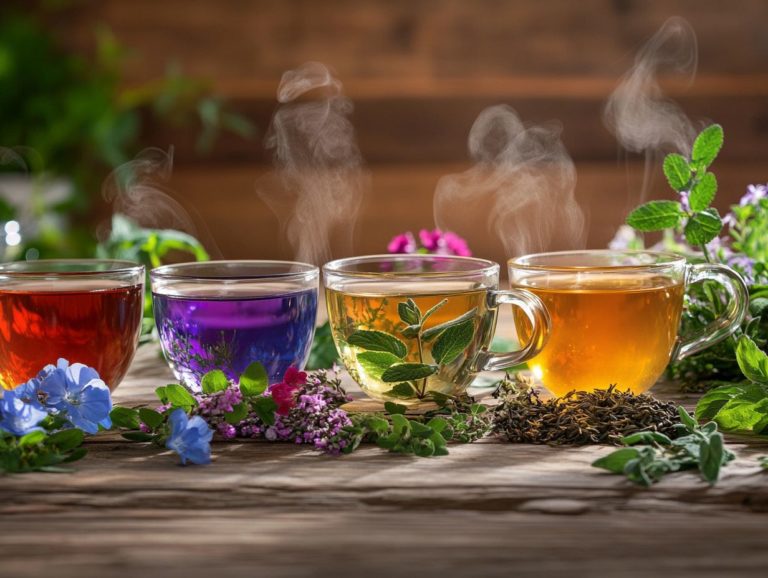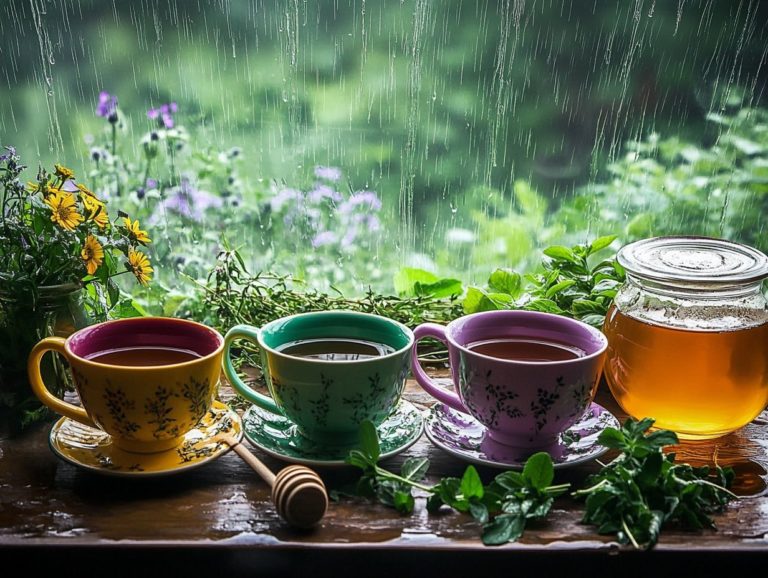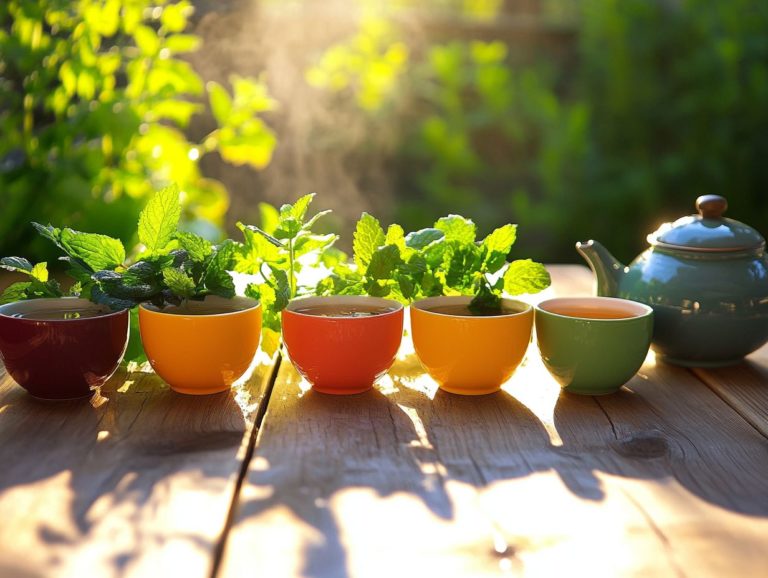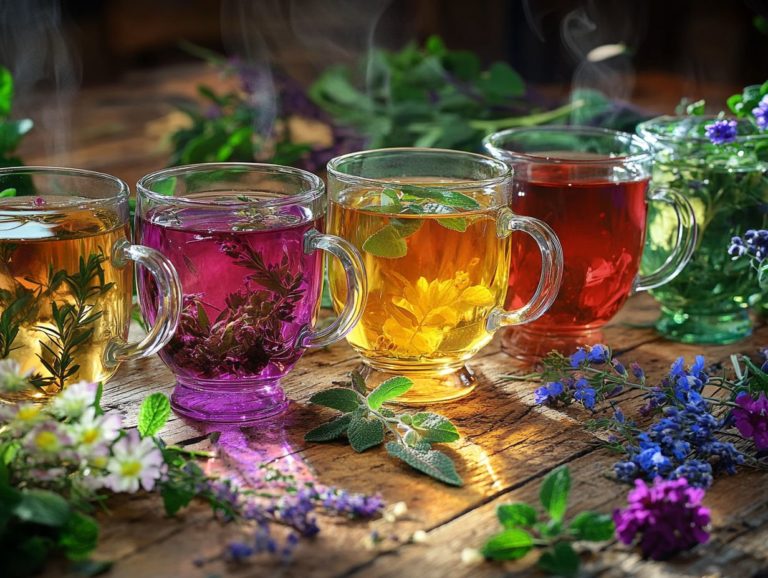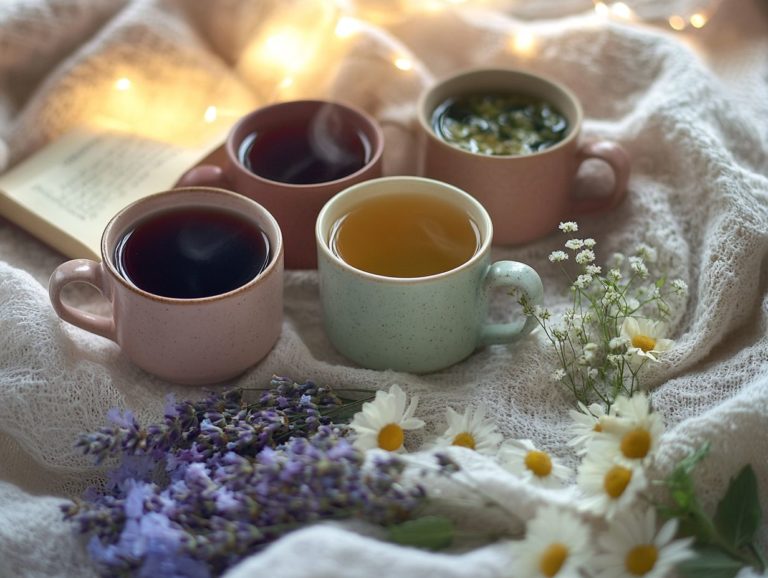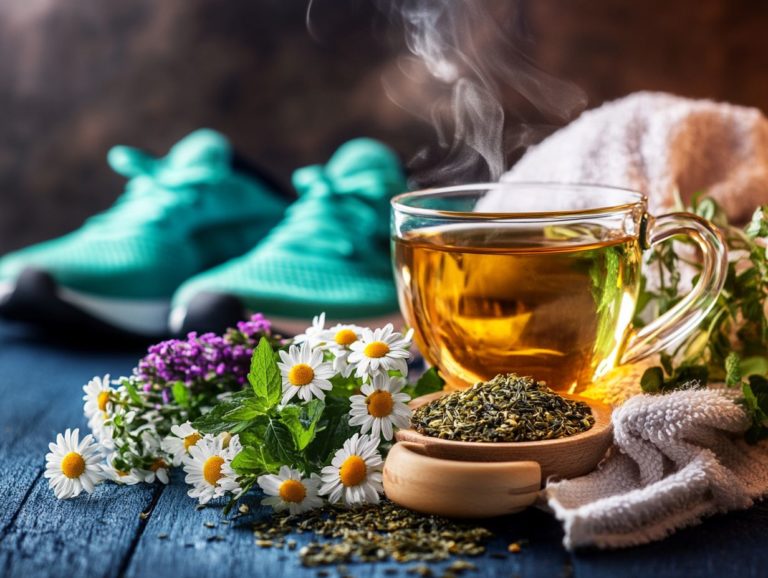5 Best Herbs for Calming Herbal Teas
Feeling overwhelmed? Discover how nature can soothe your stress. In today’s fast-paced world, finding moments of calm can feel like an elusive challenge. Fortunately, herbal teas provide a soothing remedy.
This article delves into five of the finest herbs: chamomile, lavender, lemon balm, passionflower, and valerian root. These herbs can help you unwind and promote relaxation.
Explore the unique benefits of each herb. You will learn how to incorporate relaxing teas and herbal blends into your daily routine.
We will also address potential side effects and natural ways to manage stress. Start sipping now to discover your path to serenity!
Contents
- Key Takeaways:
- 1. Chamomile
- 2. Lavender
- 3. Lemon Balm
- 4. Passionflower
- 5. Valerian Root
- What Are the Benefits of Drinking Herbal Teas for Relaxation?
- Frequently Asked Questions
- 1. What are the top 5 herbs for making calming herbal teas?
- 2. How do chamomile and lavender help to calm the mind and body?
- 3. Why is lemon balm a popular choice for calming herbal teas?
- 4. What makes passionflower a beneficial herb for relaxation?
- 5. Can valerian root be used to improve sleep quality?
- 6. Are there any potential side effects of using these herbs in herbal teas?
Key Takeaways:
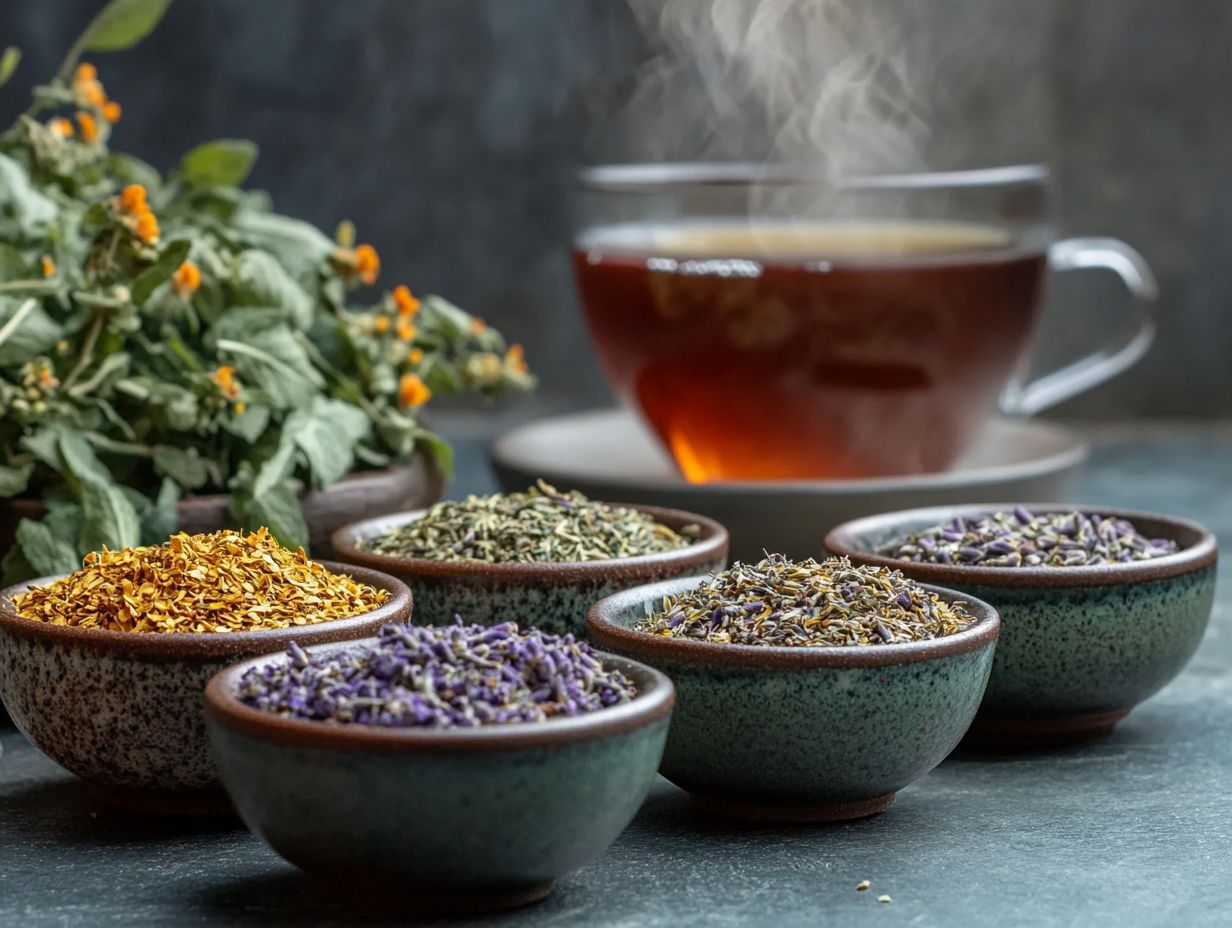
- Chamomile is a popular herb known for its calming properties. It can help with sleep, anxiety relief, and digestive health.
- Lavender is another well-known herb that is commonly used in herbal teas for its relaxing effects, helping with stress, headaches, and sleep.
- Lemon Balm is a versatile herb that aids in anxiety disorders, insomnia, and indigestion, making it an excellent choice for stress management.
1. Chamomile
Chamomile tea, derived from the vibrant chamomile flower, has been a natural remedy for stress and anxiety relief for centuries. Its soothing properties enhance sleep quality and support digestive health.
This herbal tea is often enjoyed as a calming nighttime ritual. Crafted from organic ingredients, it delivers maximum health benefits and is essential for your relaxation routine.
Ancient civilizations like the Egyptians and Greeks recognized the calming effects of chamomile. Today, many individuals seek its gentle embrace to navigate daily stress, fostering a sense of peace amidst chaotic lifestyles.
Sipping chamomile tea can become a delightful ritual. Whether enjoyed solo or enhanced with honey and lemon, it transforms into a comforting experience.
Brands like Tazo and Twinings offer exquisite options, enriching your tea-drinking moments and solidifying this herbal brew as a timeless favorite for tranquility seekers.
2. Lavender
Lavender, renowned for its delightful aroma, is celebrated for its benefits as a herbal tea. It provides stress relief and alleviates anxiety, making it a sought-after ingredient in soothing blends.
This fragrant herb possesses calming properties that genuinely promote relaxation and enhance your mood. Enjoying a warm cup of lavender tea can be a delightful way to unwind after a long day.
Lavender isn’t just for tea; it graces various products like essential oils and bath soaks, showcasing its ability to ease tension. As more individuals pursue natural ways to feel better, lavender emerges as a cherished remedy for peace and tranquility.
3. Lemon Balm
Lemon balm, a charming member of the mint family, offers a soothing herbal tea that elevates your relaxation rituals. It provides significant stress relief and helps manage anxiety disorders.
The gentle aroma and flavor of lemon balm create a refreshing experience. You can steep this aromatic herb, whether fresh or dried, in hot water to craft a soothing beverage that uplifts your mood.
For added flavor, enjoy lemon balm tea with a touch of honey or lemon. Incorporating lemon balm into recipes like smoothies or infused waters enhances your sense of calm throughout the day.
It offers a refreshing and elegant approach to stress management that anyone can embrace easily.
Don t wait! Brew a cup of your favorite herbal tea tonight and feel the difference!
4. Passionflower
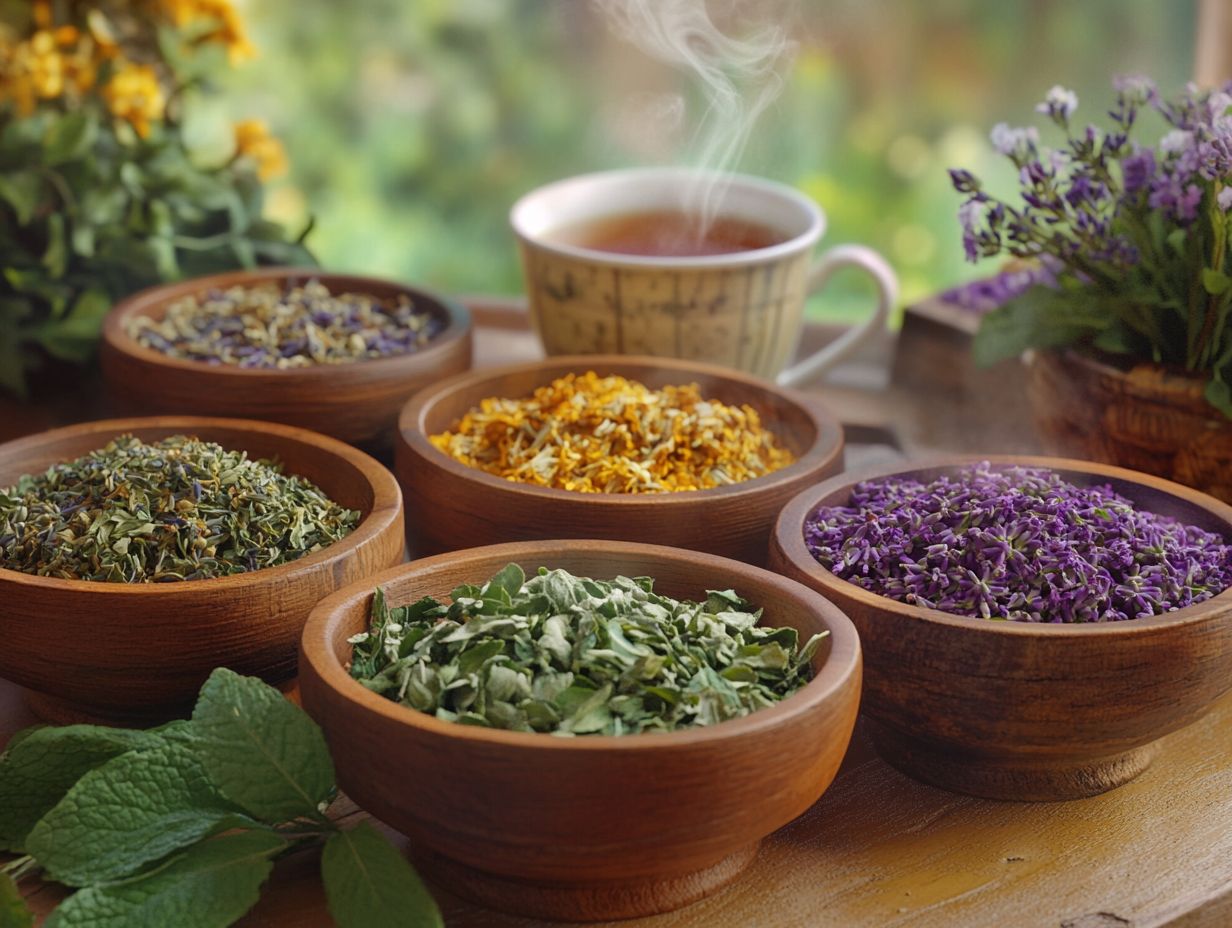
Passionflower is often found in herbal teas. It’s renowned for its remarkable relaxing effects, making it a prime choice for anyone seeking stress relief and anxiety support through natural remedies such as chamomile and valerian root.
This extraordinary plant, rich in active compounds like flavonoids and alkaloids, boosts the production of gamma-aminobutyric acid (GABA), a brain chemical that helps you relax. By regulating your mood and easing feelings of unease, passionflower can become an invaluable asset in your wellness toolkit.
To seamlessly integrate it into your daily routine, consider these options:
- Savor a warm cup of passionflower tea in the evening.
- Add a few drops of extract to a soothing bath.
Pair passionflower with calming practices like meditation or deep breathing for even better results, guiding you toward a more relaxed state of mind.
5. Valerian Root
Valerian root, often enjoyed as an herbal tea, is celebrated for its ability to enhance sleep quality while offering stress relief and soothing effects. It’s a go-to natural remedy that truly helps anyone dealing with anxiety.
Its origins trace back to ancient Greece and Rome, where it was used to combat insomnia and promote overall well-being. Today, valerian root remains popular among those seeking an all-natural solution for their sleep challenges.
The benefits of valerian extend beyond restful nights. Research indicates it can significantly diminish feelings of unease and restlessness, improving sleep quality and fostering a more tranquil state of mind.
If you’re interested in preparing valerian root tea, steep dried root in hot water for 10-15 minutes to create a delightful aromatic infusion. You can sweeten it with honey or blend it with calming herbs like chamomile or lavender for an enhanced experience. For more ideas, check out these delightful DIY herbal teas for wellness.
What Are the Benefits of Drinking Herbal Teas for Relaxation?
Drinking herbal teas for relaxation offers a treasure trove of health benefits, including stress relief and enhanced digestive health. The calming effects of various herbal blends can support your overall well-being, especially if you’re navigating the challenges of anxiety disorders.
These soothing beverages often feature ingredients like chamomile, known for inducing sleepiness and alleviating tension. Lavender, with its calming properties, can help lower your heart rate and cultivate a sense of peace. For additional relief, consider trying the top 5 DIY herbal remedies for stress relief, which include lemon balm, a favorite renowned for its mood-enhancing qualities and knack for easing anxiety.
Each of these herbal ingredients plays a unique role in relaxing your mind and stabilizing your emotions. Embracing herbal teas, especially herbs that support healthy digestion, becomes an effective strategy for gracefully managing everyday stressors.
How Do These Herbs Help with Relaxation?
The herbs featured in relaxation-focused herbal teas, such as chamomile, lavender, and valerian root, work in harmony to deliver calming effects, making them powerful natural allies in your quest to manage stress and anxiety.
These ingredients boast unique chemical compounds that engage with neurotransmitters in your brain, effectively alleviating stress and unease. Chamomile contains apigenin, which binds to specific receptors and may help reduce anxiety.
Research shows that lavender can lower your heart rate and enhance sleep quality, while valerian root is linked to increased GABA levels in the brain, essential for relaxation and effective stress management.
Incorporating these herbal teas into your daily routine, whether sipping a cup before bedtime or during a hectic workday, can be a straightforward yet powerful strategy for keeping your stress levels in check. Start your journey to relaxation today with these wonderful herbal options, including 5 common herbs with healing properties!
What Are the Other Health Benefits of These Herbs?
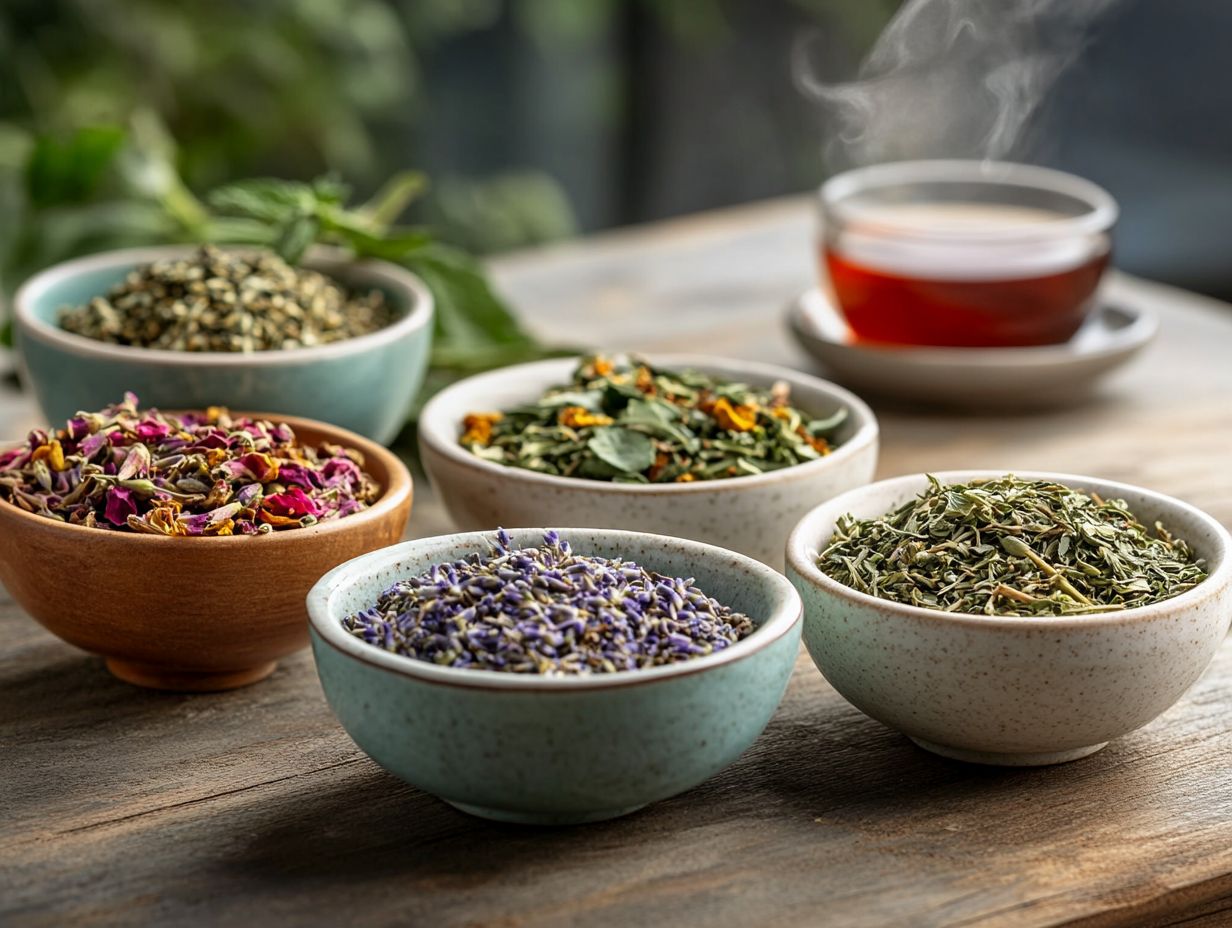
Along with their calming effects, herbs like chamomile and ginger offer a treasure trove of health benefits. They enhance digestive health, support the immune system, and provide anti-inflammatory effects that elevate overall well-being.
These remarkable herbs do more than provide tranquility; they help fortify your body’s defenses. Chamomile is renowned for calming anxious minds and improving sleep quality, making it one of the 5 must-try herbal preparations for better sleep, an essential component of a robust immune system.
Ginger has powerful antioxidant and anti-inflammatory properties. It alleviates discomfort and boosts circulation, promoting better physical health. Together, these herbs create an approach that nurtures both mental and physical wellness, giving you the power to lead a healthier, more balanced life.
How Can One Incorporate These Herbs into Their Daily Routine?
Incorporating herbal teas into your daily routine is an elegant way to harness their calming effects. This simple yet impactful method enhances relaxation and reduces stress through natural remedies.
Start your day with a cup of invigorating peppermint or ginger tea for an energy boost! It awakens your senses and lifts your spirits, making it a splendid choice for your morning ritual.
As the afternoon lull sets in, indulge in a soothing chamomile or lemon balm blend. This delightful pause refreshes your spirit and sharpens your focus, alleviating the day’s stress.
When evening arrives, wrap up with a calming lavender or valerian root tea to prepare your mind and body for restful sleep. By thoughtfully selecting herbal blends for different times of the day, you cultivate an overall wellness routine that seamlessly integrates into your life, including how to craft herbal remedies for stress relief.
Are There Any Potential Side Effects of These Herbs?
While herbal teas are often considered safe, it s crucial to be aware that some herbs can have potential side effects. Understanding the implications of consuming herbal blends is essential, and seeking advice from a healthcare professional when needed is wise.
Consider chamomile and hibiscus. Though celebrated for their soothing properties, they can trigger allergic reactions or interact with medications when consumed in excess.
If you have conditions like anemia, be particularly cautious with teas high in tannins, as these are compounds in tea that can affect iron absorption.
The importance of moderation cannot be overstated, especially for those with underlying health concerns. Even natural remedies can have unexpected consequences.
Pay attention to your body’s reactions and be mindful of specific contraindications. These are vital steps to ensure that your herbal tea consumption enhances your wellness routine rather than hinders it.
What Are Some Other Natural Ways to Promote Relaxation and Reduce Stress?
Beyond the soothing embrace of herbal teas, a wealth of natural remedies awaits you, each designed to promote relaxation and alleviate stress. Mindfulness practices, yoga, and aromatherapy are just a few methods that contribute to calming effects.
By incorporating mindfulness techniques like deep breathing or meditation, you can center your thoughts and cultivate a sense of peace amid daily chaos. Yoga not only enhances physical flexibility but also nurtures mental clarity and emotional balance, making it a perfect complement to the tranquil ritual of sipping herbal teas.
Essential oils used in aromatherapy can elevate your mood and create a serene atmosphere, enriching your relaxation experience. Combining these techniques embraces a comprehensive approach to stress relief, promoting physical well-being and emotional tranquility.
Frequently Asked Questions
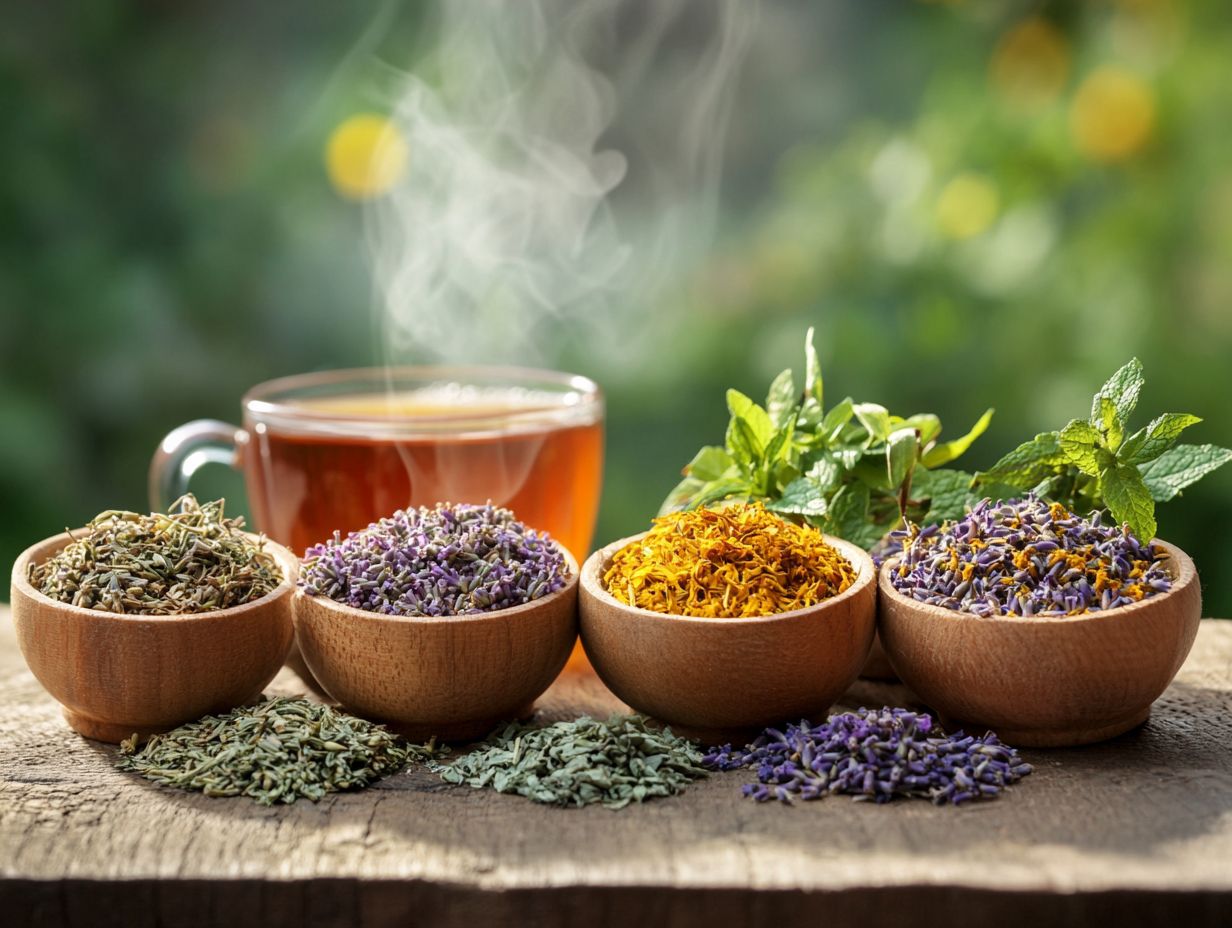
1. What are the top 5 herbs for making calming herbal teas?
The top 5 herbs for calming herbal teas are chamomile, lavender, lemon balm, passionflower, and valerian root.
2. How do chamomile and lavender help to calm the mind and body?
Chamomile and lavender contain natural substances that help you relax. They reduce stress and anxiety effectively.
3. Why is lemon balm a popular choice for calming herbal teas?
Lemon balm has been a natural remedy for anxiety and insomnia for centuries.
It promotes relaxation and boosts mood.
4. What makes passionflower a beneficial herb for relaxation?
Passionflower increases levels of gamma-aminobutyric acid (GABA), a substance in the brain that reduces anxiety.
This promotes a strong sense of relaxation.
5. Can valerian root be used to improve sleep quality?
Yes! Valerian root has been a trusted natural sleep aid for centuries.
It can significantly improve your sleep quality and help reduce insomnia.
6. Are there any potential side effects of using these herbs in herbal teas?
These herbs are generally safe for most people.
However, consult a healthcare professional before using them, especially if you take medications, as some may cause drowsiness or interactions.

